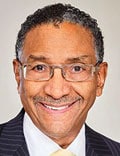Black health care workers have suffered blows to their lives and careers over the past year. Racial disparities in health care continue as more and more Black people continue to be disproportionately affected by disease and death. With another pandemic-era Juneteenth this weekend, the holiday’s message — of freedom, perseverance and hope — is even more poignant. It is also an opportunity to remember the people who are on the frontlines trying to enact change and hear their stories of how the past year has changed them and their view of the world.
The Black community has suffered massive losses due to lack of access to health care. Coronavirus hospitalization rates among non-Hispanic Black people were about 4.7 times the rate of non-Hispanic white people. A study from the Kaiser Family Foundation found that despite communities of color being more affected by COVID-19, there was “a consistent pattern across states of Black and Hispanic people receiving smaller shares of vaccinations.”
The amount of loss to Black Americans has pushed Black health care workers to speak out against the disparities in the system. Many, contacted by WebMD, believe this past year has opened not only their eyes, but the eyes of the world as well.
Jenay Powell, MD, is executive director of the White Coats Black Doctors Foundation, which was founded by five Black medical students to “celebrate, unite, and uplift black medical students and physicians, and to support the development of future black physicians.”

Dr Jenay Powell
Powell says Juneteenth is inherently important to Black Americans, who see it as their own Independence Day as slavery still ruled the country on July 4, 1776.
Powell says she has seen an increased willingness in the United States to join in honoring the day. That’s not the only change she says she’s noticed.
In the past year, Powell says, awareness of racial disparities has improved.
“I think we need to do due diligence and make sure the awareness is not short lived. Disparities are systemic and long-standing and they won’t be fixed overnight. Continuing to put a spotlight on the determinants of health and other factors that lead to these poor health outcomes is going to be the key to ultimately making improvements.”
That’s why, although Juneteenth is important, that sort of awareness must continue.
“The black experience happens 365 days a year,” says Powell, an internal medicine resident at the University of Tennessee Health Sciences Center in Nashville. “I think it’s great we have a day where everyone is working together and celebrating and reflecting what the life experience is for black Americans like myself. We have to be sure we are mindful that we are not confining our recognition of the experience to just one day.” Lutricia Harrison, doctor of nursing practice and an advanced nurse practitioner in Houston, says she has committed to doing the same.
“After this past year, I have decided to speak up and out against racism in health care,” she says. “I am actively working to address racial equity and combating health care disparities. We, as Black health care professionals, cannot stand on the sidelines and be quiet anymore. It is our duty and obligation to be an advocate for the patients and ourselves.”

Dr Rodney Hood
At the same time, Rodney Hood, MD, of San Diego, president of the Multicultural Health Foundation, says Juneteenth is about all of us.
“Juneteenth is not about black history, it is about American history,” Hood says.
In the past year, he says, there is growing realization that racial inequities are systemic. “I think the combination of COVID, which was terrible especially for black folks, and then George Floyd” led to this realization, he says. “Anytime a crisis hits, it always affect us more,” he says of black and Latino populations.
To correct the inequities in health care and other areas, some people talk about distributing services equally. That’s not the solution, Hood says. “You don’t want to distribute things equally,” he says, but rather equitably. “Equitably is based on need. That’s how you catch up. Once you catch up, you can start talking about equal.”

Dr Medell Briggs-Malonson
Medell Briggs-Malonson, MD, chief of health equity, diversity and inclusion for UCLA Health, sees a silver lining, yet also finds that how we describe the problems in America matters as well.
“For the first time, our country and our world started to sense how patients’ health was impacted by inequities. People for the first time started to open their eyes. We have started to acknowledge more the ribbon of humanism that connects us all. We are finally starting to look at each other and say, ‘You deserve the best, I deserve the best.”’
She takes issue with using the word disparities, however, when talking about health and minorities. “Disparities is rooted in the term equality and assumes everyone will benefit from the same thing.”
That would be comparable to assuming everyone wears a size 7 shoe and giving that size to all, equally, despite the fact that size won’t fit many.
“Disparities is the wrong term,” she says. A better term is health inequities.
“The pandemic actually showed the level of inequities” among different racial groups.
She welcomes increased attention for Juneteenth. “The remnants of slavery still exist to this day,” says Briggs-Malonson, an associate clinical professor of emergency medicine at UCLA’s David Geffen School of Medicine. “We still have inequities.”
She hopes it will be an opportunity to reflect on, and correct, the inequities.

Dr Idoroenyi Amanam
The pandemic has shined a light on inequities and along with it, the distrust of the health care system in certain communities, Idoroenyi Amanam, MD, a hematologist-oncologist at City of Hope in Los Angeles, says.
“The distrust of our health care system in certain communities is based on America’s past. When we interact with certain patients, we have to know the origin of these misgivings. If providers are wholly unaware of this historical context, then that’s a necessary connection that may be lost. I believe it’s very important to understand our history so that this information can help frame our understanding as to why certain things exist today.”
While Idoroenyi Amanam, MD, a hematologist-oncologist at City of Hope in Los Angeles, is glad Juneteenth and its origins have more intrinsically entered the American conversation, talking about it is not enough.
“The distrust of our health care system in certain communities is based on America’s past. When we interact with certain patients, we have to know the origin of these misgivings,” he says.

Dr Danielle J. Johnson
He has seen the real world impacts.
“In many malignancies, people of color take longer to be diagnosed, they often are at a more advanced stage at the time of diagnosis and there are fewer treatment options afforded to them when they have the opportunity to receive treatment,” he says. “These truths haven’t changed much in the United States.”
And of course, he says, racial inequities extend beyond health care.
“This past year has really reminded us that disparities amongst certain groups spread across multiple spheres of life: health care, education and justice, to name a few,” he says. “I think our country, as a whole, is just beginning to figure out how to address these big problems.”
Danielle J. Johnson, MD, a fellow of the American Psychiatric Association in Mason, OH, helps patients deal with, and recover from, the pandemic and all manners of mental health challenges.
As a Black doctor, however, she says she and others need support as well.

Max Jordan Nguemeni Tiako
“It has been rewarding to see more people willing to get treatment and to know that the stigma of seeking treatment is reduced but also taxing to hold others’ trauma while dealing with it myself,” she says. “It’s sad to know that so many people are struggling.”
Max Jordan Nguemeni Tiako is part of the future of American medicine. A fourth-year medical student at Yale School of Medicine, understands what Johnson means.
“Being in health care and witnessing so much suffering, specifically inflicted upon Black people because of inequality in our society, does something to the psyche of black health care workers.”
SOURCES:
Kaiser Family Foundation: “Latest Data on COVID-19 Vaccinations by Race/Ethnicity”
Mayo Clinic: “Coronavirus infection by race: What’s behind the health disparities?”
Jenay Powell, MD, executive director, White Coats Black Doctors Foundation.
Lutricia Harrison, doctor of nursing practice, advanced nurse practitioner, Houston.
Rodney Hood, MD, president, the Multicultural Health Foundation, San Diego.
Medell Briggs-Malonson, MD, chief of health equity, diversity and inclusion, UCLA Health.
Idoroenyi Amanam, MD, hematologist-oncologist, City of Hope, Los Angeles.
Danielle J. Johnson, MD, fellow of the American Psychiatric Association, Mason, OH.
Max Jordan Nguemeni Tiako, medical student, Yale School of Medicine.
Source: Read Full Article
